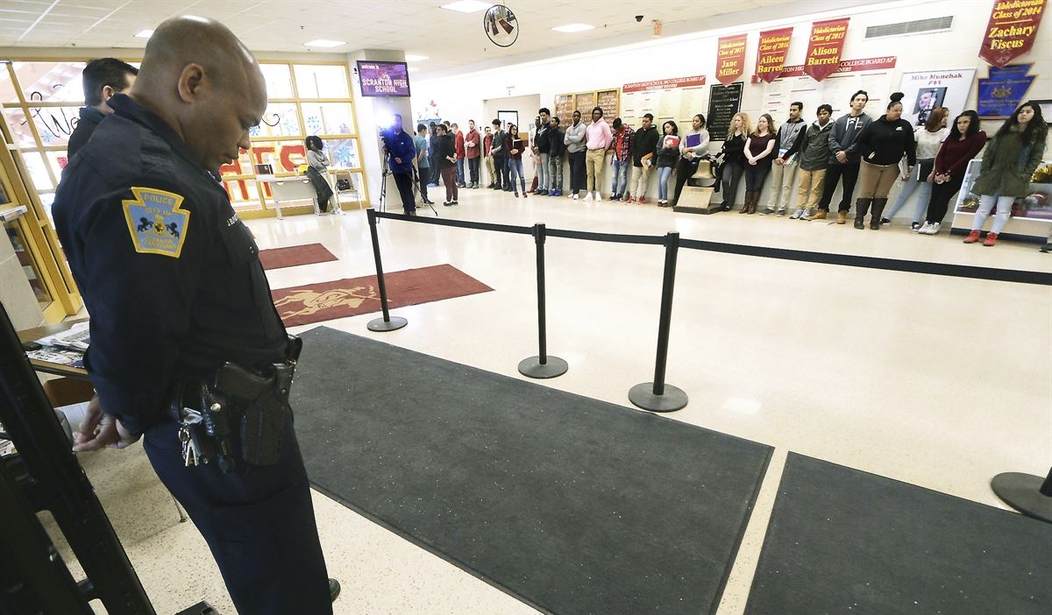Back in 2020, at the height of the “defund the police” movement, the Denver Public Schools board took the bold step of removing school resource officers from every campus under the dubious theory that having armed police on campus actually put students at greater risk. But after a high school student who’d previously been expelled from one campus because he brought a gun to school shot two school officials at the high school he’d been reassigned to attend (on the condition that he be patted down and screened for weapons on a daily basis), DPS put a temporary halt to that policy and returned SROs to campus.
Now the school board has decided to make that return permanent, voting 4-3 last Thursday to end the failed experiment and keep the SROs in place.
In doing so, Colorado’s largest school district has joined a handful of others across the United States in rolling back policies enacted amid the national racial reckoning that occurred three years ago after the murder of George Floyd, a Black man, by a white police officer in Minneapolis.
The policy adopted on Thursday supersedes the board’s 2020 resolution and directs Superintendent Alex Marrero to enter into a memorandum of understanding with the Denver Police Department regarding the presence of officers on both district-run and charter school campuses.
Members who voted in favor of the new policy said it was not an easy decision, but they’ve heard from people in the community, including principals, who wanted officers to return to schools.
“There is a real fear and that sense of fear — we cannot ignore that,” said President Xóchitl “Sochi” Gaytán. “Whether this brings back this false sense of security or not, school leaders are asking us for that collaboration.”
But Board Vice President Auon’tai Anderson called the vote a “step back.”
“Taking out cops wasn’t a mistake,” he said.
Voting to allow SROs to return to schools means “supporting the status quo of white supremacy,” Anderson said ahead of the vote, adding, “It will come across as a statement that Black lives do not matter as much.”
Anderson, who led the push to remove SROs in 2020, voted against the policy. He and two other members — Michelle Quattlebaum and Scott Esserman — had proposed a policy change that would have kept the SRO prohibition in place and used community resource officers to respond when needed. The community resource officers would have been stationed in neighborhoods near schools rather than on the actual campuses.
Anderson, Esserman and others on the board have said having police in schools harms students of color and contributes to the school-to-prison pipeline, which happens when pupils become involved in the criminal justice system as a result of policies that use law enforcement to address behavioral issues.
“What are we going to do when (SROs) do harm?” Esserman asked his colleagues, adding, “The police system in America is designed to oppress.”
And yet, I bet if you asked Esserman if he supports the state’s ban on “large capacity” magazines, its universal background check mandate, or other possessory gun offenses enforced by armed agents of the state he’d answer in the affirmative. In fact, I know he would, because he signed on to a statement of support when Denver students walked out of class earlier this year to protest in favor of more of those gun control laws enforced by “oppressive” police officers.
The Board of Education stands with our students in their phenomenal act of civic engagement. We encourage every person in Colorado to take ownership of the safety and well-being of our young people.
DPS is committed to ensuring that we provide safe and supportive learning environments for our scholars. We remain focused on the issue of gun violence and addressing the social, emotional, and mental well-being of those who have been traumatized by these instances, both locally and across the country. Our students demanding change and holding our public leaders accountable for gun violence is the type of display of civic action we will continue to promote in our scholars.
As a school district and as a Denver community, we hold the safety of all our students as our highest priority. We know that combating the negative impact of violence on young people requires the collaboration of many individuals, groups and agencies. From educators and family members, to law enforcement and lawmakers, each person has a role to play in this important work. We, along with school staff and families, were proud to walk with the students.
East Students Demand Action has commanded our attention, here in Colorado and across the nation as a student-led movement unafraid of overcoming the obstacles which confront them. We stand with our students and encourage every Coloradan to join us.
Auon’tai Anderson
Scott Baldermann
Scott Esserman
Xóchitl Gaytán
Charmaine Lindsay
Carrie A. Olson, PhD
Michelle Quattlebaum
Here’s a newsflash for Esserman (as well as those student activists): by supporting gun control you are empowering the state to use armed and deadly force to make sure these non-violent, possessory gun laws are followed. You are putting a disproportionate number of black men behind bars for those non-violent possessory offenses, which aren’t even crimes in most states. You are aiding and abetting the very system you say you’re trying to undo.
The kids in the Denver public school system are going to be a little safer as a result of bringing SROs back to campus, but with anti-gun ideologues still in charge of the district I’m not convinced this change is all that permanent. All it would take is for one board member to change their mind and the SROs could once again disappear, while the threats to their safety remain in place thanks to their regressive approach to dealing with violent offenders in the classroom.









